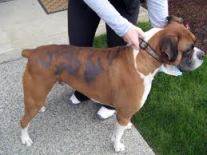Have you ever been in the position where one day you suddenly notice that your dog doesn’t quite seem to have the beautiful, glossy, full coat of hair it used to? If so it is possible that you may have inadvertently missed noticing some of the symptoms which can cause hair loss in dogs. Not all symptoms are obvious, some are subtle and tricky to spot. Over the following paragraphs we will take a short look at some of the signs to keep an eye out for so that if they manifest in your dog you can act quickly to stop or arrest the development of your dog’s hair loss.
Nasty things such as lice, ticks, mites, fleas and other irritating parasites are a perennial bane for all our pets. Dogs being no exception. Those pesky bugs can cause severe itching, irritation and scaly skin. Add to this other unpleasant things such as ringworms and other fungal infections which can also have an adverse impact on your dog’s skin. Your dog will react by scratching vehemently and restlessly. The very act of scratching along with scaling and weakening skin will lead to increased hair loss.
Allergies
Your dog could be allergic to certain food and other materials. The list of irritants includes food ingredients, dust, moulds, certain metals, pollens, dust, rubber, chemicals, certain medications and even erratic weather patterns. Exposure to any of these irritants could trigger some hair loss and needs to be watched carefully. If your dog develops allergies then it can be a case of trial and error to see what is causing it and eradicate the cause if food related. Dust allergies can be contained by keeping the dog’s bedding area scrupulously clean as you would do with your house anyway.
Hormone Related
Abnormal hormonal levels in dogs could also lead to increased hair loss. Hypothyroidism is a condition that afflicts dogs too, just as in us humans. A dog suffering from hypothyroidism has a thyroid gland that fails to produce the adequate amounts of T3 and T4 hormones. This condition could lead to a situation where the skin becomes excessively dry and patchy. The skin is unable to hold the roots of the hair and will fall out.
Other Health Conditions
Another common cause is Cushing’s disease. A dog suffering from this disease has increased production of corticosteroid. Not dissimilar from humans, if your dog suffers from diabetes, chances are that there could be increased hair loss.
In the unfortunate situation where your dog is diagnosed with some form of cancer, it may need to go through the arduous treatment of chemotherapy. During the treatment your dog will be exposed to strong chemicals and radiation. This exposure will lead to an increase in hair loss as well.
Keep an eye on any changes in the behaviour or personality of your dog. If you see changes like increased anxiety, aggression, lethargy and other behavioural anomalies, then there could be cause for concern. Dogs with behavioural issues are highly likely to chewing, licking and biting themselves all too frequently. This can cause irritation of the skin leading to a condition where there will be increased loss of hair.
The above has hopefully given you some useful information on how you might tackle hair loss in your dog. However if in any doubt it is suggested you consult with your vet for professional advice, diagnosis and treatment options.
I hope you found this article useful and informative on what can be a distressing subject for both dog and owner. For additional information about hair loss in dogs, the causes and treatment please visit http://www.doghairloss.co.uk - you can also download a totally free ebook from the web site.
Article Source:Â http://EzineArticles.com/?expert=Andy_Machin

没有评论:
发表评论